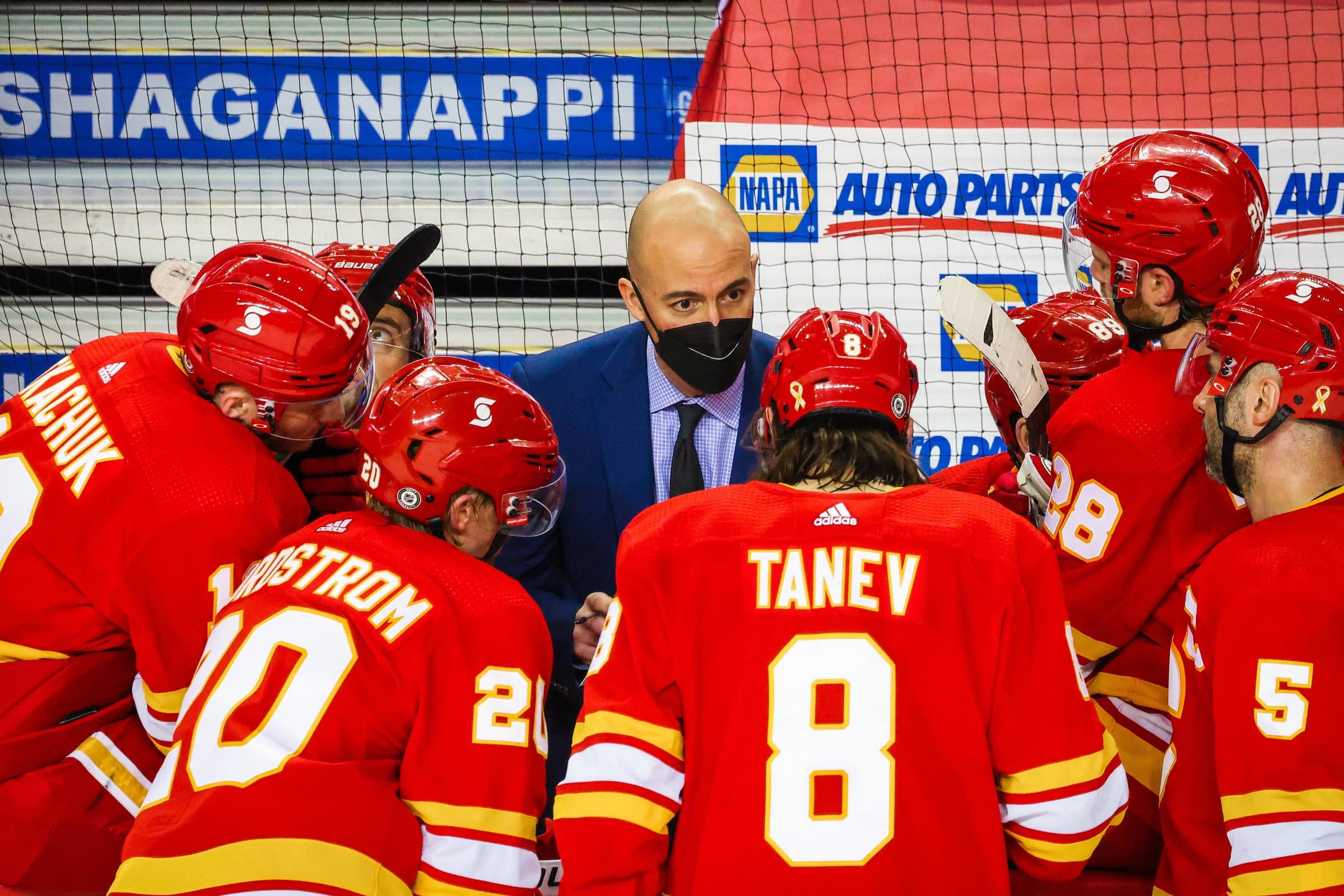Nation Sites
The Nation Network
FlamesNation has no direct affiliation to the Calgary Flames, Calgary Sports and Entertainment, NHL, or NHLPA
Digging into Ryan Huska’s pro coaching track record

Photo credit: Sergei Belski-USA TODAY Sports
On Monday, the Calgary Flames announced that Ryan Huska is the club’s newest head coach. Huska comes to the Flames from within the organization, where he’s spent much of the past decade. Heck, Huska’s entire run in coaching professional hockey has happened within the Flames system.
So how has Huska done in his coaching roles thus far?
Adirondack Flames/Stockton Heat, head coach (2014-18)
Huska was recruited to the American Hockey League in summer 2014 by newly-minted general manager Brad Treliving. At the time, Huska was in the midst of a long run as head coach of the Western Hockey League’s Kelowna Rockets and had built a reputation as a really savvy developer of young talent.
The mindset in the Flames’ system was simple: develop NHL players to send to the Flames. Everything else was secondary.
“When I interviewed with Brad (Treliving), Connie and Brad (Pascall), they made it very clear that priority No. 1 is developing guys and making sure they’re ready to play in the NHL,” Huska said. “Tree even said it one time. I don’t care if you guys go 0-72, as long as guys develop. Then he stopped and caught himself. Well, maybe not 0-72.”
Over four seasons split between Adirondack and Stockton, the Baby Flames made the playoffs once – they lost a five-game series to the San Jose Barracuda in 2017.
But a lot of young prospects made strides towards the NHL in their time with Huska. Here’s a list of eventual NHLers, with regular season games under Huska included:
- Oliver Kylington: 169
- Garnet Hathaway: 165
- Ryan Lomberg: 140
- Andrew Mangiapane: 120
- Rasmus Andersson: 110
- Brett Kulak: 107
- Jon Gillies: 85
- Mark Jankowski: 78
- David Rittich: 43
- Dillon Dube: 6
The marching orders for Huska were “turn these kids into NHL players.” During his tenure, he did so well enough that when his contract expired after the 2017-18 season, he was offered a promotion to the NHL staff.
Calgary Flames, assistant coach (2018-23)
Huska spent five seasons as an assistant coach for the Flames under three different head coaches: Bill Peters (2018-19), Geoff Ward (2019-21), and Darryl Sutter (2021-23). His responsibility was managing the defensive group and the penalty kill.
Here’s how the penalty kill fared under him. (We’ve included the 2017-18 season, before Huska got promoted, as a control to compare to.) We’re looking at the PK’s overall percentage, along with some process stats – expected goals against (xGA), scoring chances against (SCA) and high-danger chances against (HDCA), all at a per-60 minutes rate.
Season | Pct. (Rk) | xGA/60 | SCA/60 | HDCA/60 |
2017-18 (pre) | 81.8% (7th) | 7.45 (21st) | 54.77 (23rd) | 23.84 (23rd) |
2018-19 | 79.7% (21st) | 6.37 (15th) | 49.26 (18th) | 22.34 (25th) |
2019-20 | 82.1% (8th) | 6.79 (21st) | 54.80 (28th) | 20.22 (16th) |
2020-21 | 80.2% (15th) | 6.00 (9th) | 52.48 (24th) | 18.12 (14th) |
2021-22 | 83.2% (6th) | 5.71 (2nd) | 45.45 (4th) | 15.24 (1st) |
2022-23 | 82.6% (5th) | 6.71 (2nd) | 52.16 (6th) | 21.28 (4th) |
The impressive thing, to me, is that Huska’s penalty killing group kept improving its performance even as the cast of characters kept changing. How many penalty kills lose a Norris Trophy winner like Mark Giordano and improve afterwards? While the progress wasn’t always entirely linear, Huska seemed to keep an ever-changing group on the rails, even when other things weren’t going as smoothly.
Simply put: the 2022-23 Flames were kind of a mess. Their penalty kill managed to work despite all of that.
During his post-hiring media tour, Flames GM Craig Conroy discussed the style of play he’s hoping for: defensively structured in their own zone, but with the freedom to generate offence elsewhere. If you look at the attention to detail in the penalty kill and their success, look at how he managed to mix and match defensive pairings, and see how he’s helped guys like MacKenzie Weegar, Noah Hanifin, Rasmus Andersson and Nikita Zadorov (among others) succeed over the past few seasons, it’s easy to understand why Flames management were cajoled into hiring him for the big job.
Simply put: Huska’s been given a few key coaching challenges by the Flames organization in his nine seasons with them. And so far, he’s tackled those challenges head-on and been able to succeed. Those successes have earned him his biggest coaching challenge so far: turning a habitually up and down Flames squad into a more consistent club.
Time will tell how Huska will fare in his new role, but his track record has certainly earned him the opportunity.
Breaking News
- Scotia Place: a street-level look at December construction progress
- Beyond the Boxscore: Flames come out swinging in big 6-3 win over Golden Knights
- Rasmus Andersson on remaining a Flame: ‘It takes two to tango’
- Ryan Lomberg’s big goal and big fight highlight Flames win over Vegas
- Instant Reaction: Flames overwhelm Vegas early, hold on for win
